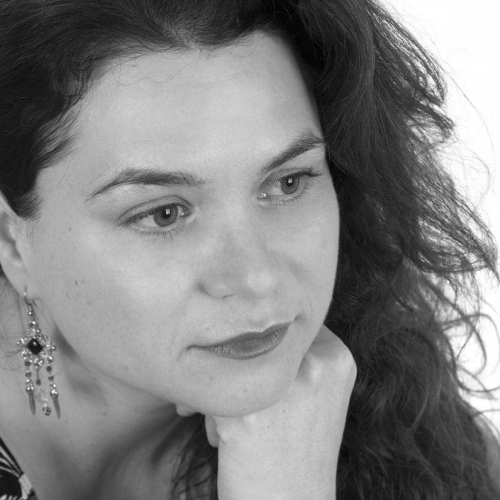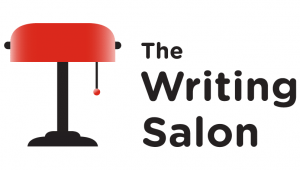Your current short film, Madame, is an official selection of the San Francisco Independent Film Festival — congratulations! Can you tell us a little bit about the process of writing and making the film?
Sure! The idea for the film came to me in the Spring of 2018. I was listening to Freya Cellista’s sound collage “St. James Park” (from her brilliant album Finding San Jose) and suddenly saw—very clearly, in my mind’s eye—a young girl, small suitcase in hand, waiting for a train. She was alone in the world, en route to an interim foster home where a shady woman awaited her arrival. I began to write these two figures down, the girl and the woman… and word by word, scene by scene, the script for “Madame” emerged.
At the time I was enrolled in a beginning filmmaking course at City College of San Francisco and had access to the department’s vast stores of equipment, so I plunged in and filmed the script with my aunt and young niece over Spring break. It was a family affair, chaotic and frenzied, shot in my mother’s house, with my sister helping me MacGyver small, impromptu soundstages out of blankets and curtains. We shot late into the wee hours of the night, and then got up early in the mornings to shoot scenes on the train, harvesting over a terabyte of footage in a very short but intense span of time.
During the pandemic and the subsequent advent of Zoom in all our lives, I happened to cross paths in cyberspace with Vermont-based filmmaker and editor Sean Temple (Water Horse, The Thaw, Thorns). I’d been struggling for over a year with an overly-long edit of my own making, and it was clear to me I didn’t have the editing chops to bring my vision to fruition. After connecting with Sean, I handed him the editing reins, and he became my co-producer, distilling the story down to its essence, paring the edit back radically in length, and pushing the piece further into the dreamlike, subconscious realm from whence it first sprang.
It took years, but I’m very pleased with the result. Filmmaking requires tenacity, because the process depends on so many moving parts coming together–which is very different from the act of writing, where it’s just you and the page.
Your class, Jumpstart Your Memoir Writing!, starts February 21 at The Writing Salon. What do you like most about memoir and creative nonfiction and what do you hope to share with students in that class?
Funny you should ask. We’re living through an immensely chaotic, unsettled and fast-paced time. Many of us are running on empty from the moment we wake up to the moment we go to bed, checking social media and the phone way too much. I honestly think that writing memoir serves as a perfect antidote to this kind of numbing-out. Every minute we spend working on something creative, tuning in, is a victory. I love that writing class offers a creative container, a kind of structured environment where students can consciously dedicate time to creative process, and carve out a world unto themselves.
This morning I was actually thinking about the first CNF/memoir class I ever took back in the late-90s with a treasure of a woman, Claudette Sutherland, in Los Angeles. The class had a seismic effect on my life; I actually shudder now to think how my life might have turned out had I not taken her class. She taught me to put words to events that had been floating around in my subconscious, driving me to act in ways that simply weren’t great. Once I put things on the page, I was able to see the past more clearly, get perspective, and view the overall narrative shape of my life thus far. I found writing not only incredibly satisfying (it’s so exciting to have a finished piece in hand!), but also quite therapeutic in that it enabled me to integrate certain unconscious parts of my psyche that had been hijacking my sanity and my life. So I found writing memoir and CNF to be therapeutic, yes–but it was more than that. Writing enabled me to take certain primal energies and funnel them into acts of creation, rather than destruction. It’s very powerful that way, writing. There’s a psychologist, James Pennebaker, at the University of Austin, who’s actually done studies on this; he’s documented the life-changing power of writing to heal trauma in his work.
And of course, on the flip side, reading the work of others builds bridges; when we enter the lives of others by reading their stories, we push past tribal differences and feel empathy, compassion for people who might be very different from us. The world is in short supply of both those things, empathy and compassion; we can always use more. I think that’s the miracle of CNF: writing helps us build compassion not only for our flawed selves, but for others.
What drew you to teaching at The Writing Salon, and what is your favorite thing about teaching here?
The students are my absolute favorite thing about teaching. I’m not sure why, but it seems to me that The Writing Salon draws the most incredible students into its orbit. On the whole, I’ve found them to be sensitive, thoughtful, brilliant, well-read, courteous and just plain hilarious. The students never cease to amaze me, and I’ve been doing this a while! It’s been a privilege to cross paths with the students, to hear their stories, and to bear witness to their stories taking shape. Honestly, the creative process never fails to strike me as nothing less than miraculous.
What are you working on now? Are there any projects you’re especially excited about?
Yes! I’m working on two things simultaneously: a screenplay for two actors whose work I absolutely love and with whom I’ve wanted to make a film for years, and also a novella-length piece of auto-fiction about a non-fiction writer whose quiet life is upended by a rogue novelist! Good times. 😉

Kerry Muir‘s plays include Running on Moontime, The Night Buster Keaton Dreamed Me, and Befriending Bertha/Conociendo a Bertha (a one-act for children), which were published in dual language (Spanish-English) editions by NoPassport Press as part of their Dreaming the Americas series, curated by Lifetime Achievement Obie Award-winning playwright, Caridad Svich. Her plays have garnered awards and productions at the Nantucket Short Play Festival, Great Platte River Playwrights Festival, Gibraltar International Drama Festival, and elsewhere. Her prose has appeared in Kenyon Review Online, Crazyhorse, Riverteeth, West Branch, Willow Springs, Fourth Genre and more. Two of her essays, “The Bridge” and “BLUR,” were named as notable in Best American Essays of 2011 and 2018, edited by Edwidge Danticat and Hilton Als, respectively. Her short film “Madame” (an official selection of San Francisco Independent Film Festival 2024, Cinema on the Bayou Film Festival 2024, AHITH Film Festival 2023) is currently making the rounds on the film festival circuit. Visit her online at: https://kerry-muir-5gnx.squarespace.com.

Kerry Muir‘s plays include Running on Moontime, The Night Buster Keaton Dreamed Me, and Befriending Bertha/Conociendo a Bertha (a one-act for children), which were published in dual language (Spanish-English) editions by NoPassport Press as part of their Dreaming the Americas series, curated by Lifetime Achievement Obie Award-winning playwright, Caridad Svich. Her plays have garnered awards and productions at the Nantucket Short Play Festival, Great Platte River Playwrights Festival, Gibraltar International Drama Festival, and elsewhere. Her prose has appeared in Kenyon Review Online, Crazyhorse, Riverteeth, West Branch, Willow Springs, Fourth Genre and more. Two of her essays, “The Bridge” and “BLUR,” were named as notable in Best American Essays of 2011 and 2018, edited by Edwidge Danticat and Hilton Als, respectively. Her short film “Madame” (an official selection of San Francisco Independent Film Festival 2024, Cinema on the Bayou Film Festival 2024, AHITH Film Festival 2023) is currently making the rounds on the film festival circuit. Visit her online at: https://kerry-muir-5gnx.squarespace.com.
